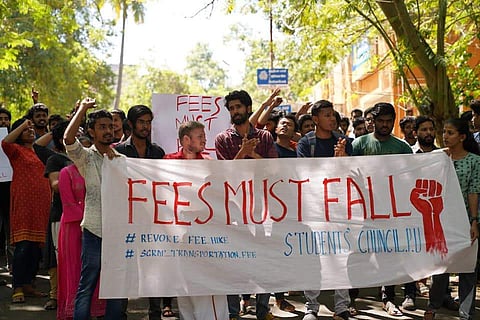

The year was 1918. That was when the world witnessed its last pandemic outbreak, before COVID-19. In a span of two years, the Spanish Flu infected over 500 million people, all around the world. The First World War was in its final leg when the flu killed more people than the war itself.
Even though the two pandemics happened a century apart, the basic human issues and troubles still remained the same in its core. They revolted then, they were revolting right before the lockdown. While Indians at that time were fighting the British, citizens of independent India in 2020 have a different set of demands. Of the protestors, one cannot disregard the students in various Indian universities. Right before people were advised to practice social distancing and the Prime Minister announced a complete lockdown, campuses were fighting against fee hikes, a section of people against policies and the CAA and NRC.
Since the beginning of 2020, the students of Pondicherry University were protesting against its administration against the hike in their tuition fees and the introduction of transport fees. A few students went on hunger strikes and even gheraoed the Vice-Chancellor. But then, Corona helped them wind that down quickly. Do they think they will restart when the varsity reopens? We asked these questions to Parichay Yadav, President, Pondicherry University Students' Council. "It will definitely be difficult to mobilise the students again, now that there is a break. This was the major reason why we began the protest right after the winter vacations had ended, even though we paid the fee beforehand. We wanted the protest to be continuous and uninterrupted until we succeed," he says. Parichay adds that the student activists are spreading messages and mobilising students over social media and WhatsApp these days.
But can a tweet or a post be as effective as students coming together? Aparna Bhattacharya, a political science researcher in JNU doesn't think so. "Proximity matters a lot, as far as student struggles are concerned. A tweet can convey a piece of information, but it is never an alternative to a protest," she says. "We cannot deny the intensity of the pandemic. The protests have therefore taken a backseat. You cannot defy the lockdown and show up on the streets. As students, you are expected to behave a certain way," she says.
Even though Aparna has no doubts about the efficacy of student protests and them happening in universities after the situation gets back to normal, she wonders if they will be issue-specific. "There will be greater solidarity among students, undoubtedly. But the students will have to struggle more to survive. The poor especially will have to fight more," she says.
The ABVP-led Delhi University Students' Union had recently gotten its administration to let the students stay in the university hostel. The organisation's Delhi State Secretary Siddharth Yadav feels that rather than conducting protests now, the elected unions must take charge of issues. "The protests will continue once the lockdown is over. But this is a good breather for people to decide between real issues and the ones pushing a certain propoganda," he says.
And what about the battleground that was and is JNU. Struggles and protests are part of the Jawaharlal Nehru University's culture, says JNUSU Councillor Apeksha Priyadarshini. In a recent incident, a student was beaten up by the security guards outside the university's campus gates. Despite the current situation, several; students had come in his solidarity. "This is how JNU is. People show up for each other, no matter what. We cannot obviously organise protests right now, even though there are ongoing issues. But once, everything's back to normal, JNU will witness these protests again," she says.
